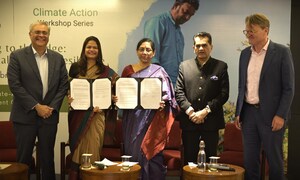Liveable Cities and Coastal Resilience: Need of the Hour
Aga Khan Agency for Habitat organised a climate action workshop to deliberate nature-based solutions for a sustainable future
MUMBAI, India, Nov. 23, 2023 /PRNewswire/ -- Aga Khan Agency for Habitat (AKAH) India launched the CLIMATE ACTION WORKSHOP SERIES titled 'Towards Net-Zero: Building Climate Resilience' at Mumbai. The series aims to provide a platform for fostering and amplifying community-centered and ecosystem-based approaches to enhance climate resilience. This is the start of conversations with business communities, capital markets, and nonprofits together, to accelerate integrated climate actions.
The event witnessed participation from government officials, environmental organizations, policymakers, and CSR professionals who shared their diverse knowledge and offered unique perspective from their industries.
In the keynote address, Mr. Sunil Pote, Executive Director (Operations), MAHAPreit, spoke about AKAH's ongoing partnership with MAHAPreit on developing city-level models to strengthen Urban Habitat Risk Resilience. Mr. Onno Ruhl, General Manager, Aga Khan Agency for Habitat, discussed the global trends in climate action in conversation with Mr. Govindraj Ethiraj, Journalist-Founder, IndiaSpend.org and The Core. Mr. Ramarao S. V., IFS, Additional Principal Chief Conservator of Forests, Maharashtra Forest Department, Govt. of Maharashtra, discussed new frameworks for mangrove restoration and supporting livelihoods. Mr. Abhijit Ghorpade, Director, State Climate Action Cell, Govt. of Maharashtra, highlighted the Govt. of Maharashtra's criteria for transforming city-infrastructure to be more environment friendly.
The workshop focused on three panel topics viz. Building Climate Resilient Liveable Cities, Building Coastal Resilience through Nature-Based Solutions, and Future of Carbon Sequestration. The discussions included the issues of institutional funding requirements, importance of funds for sustained efforts and ecosystem-based adaptations, which can help solve urban problems that otherwise demand resource-intensive technology or energy-intensive solutions. It highlighted the importance of building a foundation of preparedness among the communities that applies to multiple risk scenarios through an inclusive approach for cities. Community participation stood at the front and core to achieve long-term climate goals and the need for enabling infrastructure to nudge people into adoption of climate-friendly behavior.
AKAH is actively involved in crafting ecosystem-based models dedicated to mitigating climate-induced disasters in cities, promote coastal restoration and conservation of biodiversity. Through programs in areas of disaster risk reduction, housing improvement, urban heat mitigation, coastal restoration, biodiversity and climate change, and water security AKAH provides technical expertise to communities to thrive in a changing climate.
Following a successful workshop in Mumbai, Prerana Langa, CEO, Aga Khan Agency for Habitat India, said, "AKAH is dedicated to long-term, transformative solutions by strengthening capacity, ensuring enabling infrastructure, and supporting the local community to thrive despite climate change. Through this series, we are engaging with business communities to leverage each other's strengths for collective impact. AKAH is committed to setting nature-based goals, measuring progress, and providing guidance to our partners and drive innovation at scale."
About Aga Khan Agency for Habitat India
Aga Khan Agency for Habitat works to create habitats that allow communities to be resilient to disasters, adapt to climate change, and thrive. Through leveraging technical expertise in climate action, risk reduction and habitat improvement, it impacts urban habitat risk resilience, nature-based solutions, climate resilience & biodiversity, water security management, and school resilience. AKAH collaborates with institutions/organizations that share a commitment to promote a culture of preparedness, safeguard key infrastructure, ensure access to basic services, and build safe and green housing.






Share this article